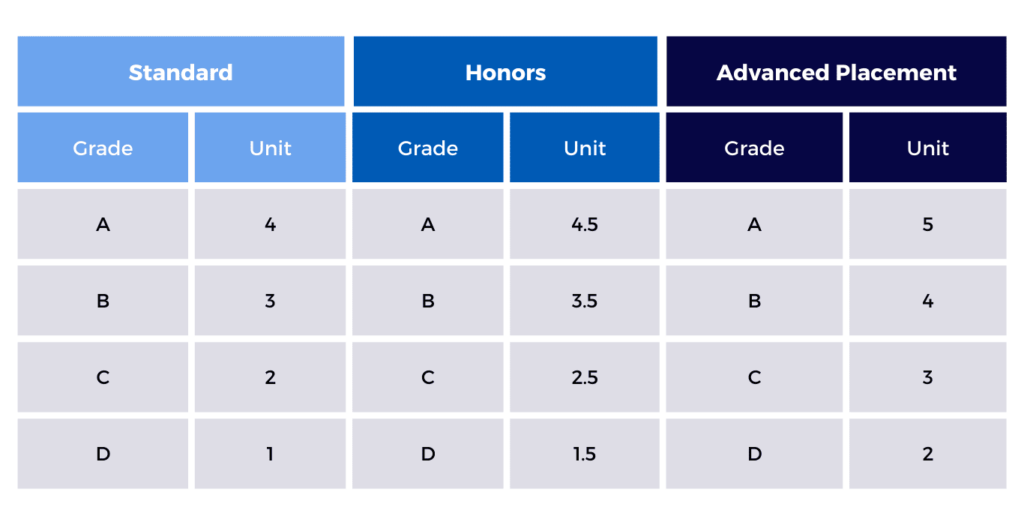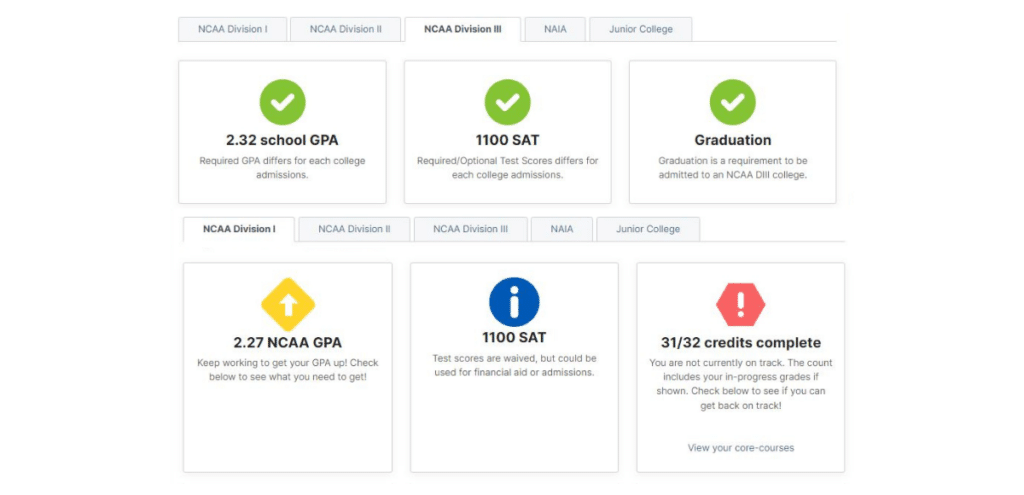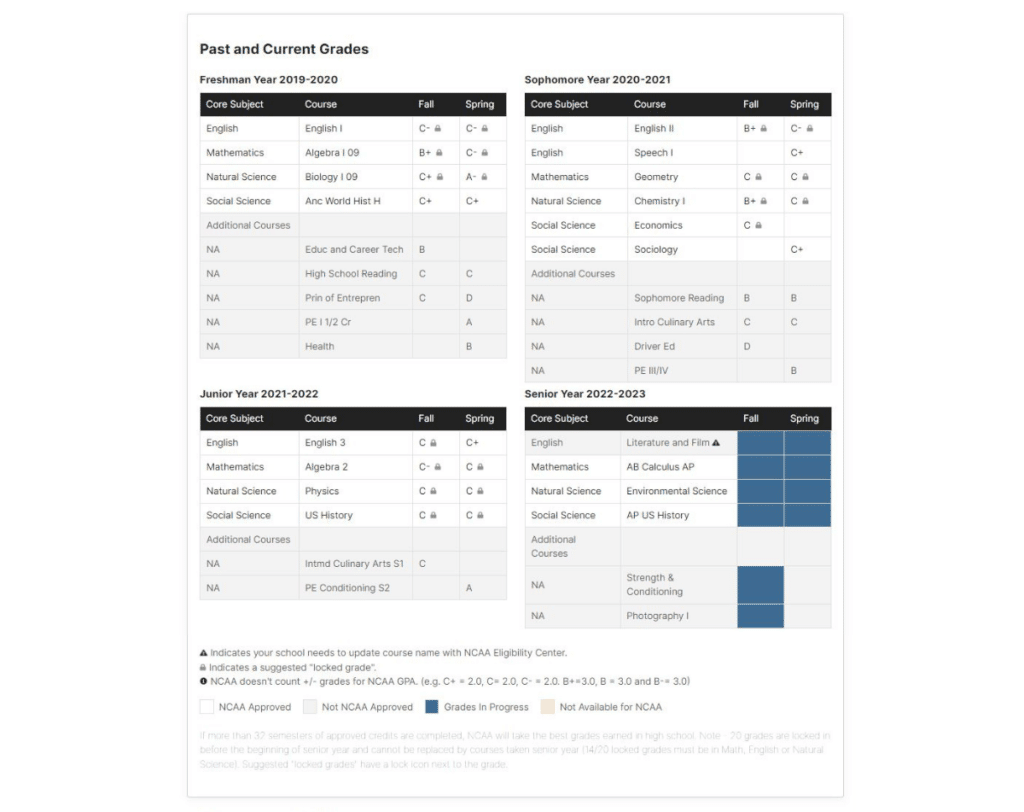NCAA Core GPA – How it’s Different from Your School GPA
Published on Aug 25, 2025

Did you know that the NCAA reviews a student-athlete’s NCAA Grade Point Average (GPA) to determine whether or not they qualify to play college athletics at an NCAA school?
Every year, student-athletes are declared academically ineligible because they took the wrong courses (not approved by the NCAA) or they didn’t meet the NCAA core GPA before finding out it was too late.
Honest Game has broken down the differences between a student-athlete’s high school GPA and the NCAA Core Course GPA requirements to help simplify the process.
How to Calculate Your School GPA
Traditionally, a student-athlete’s high school GPA is:
-
- Based on a 4.0 scale and may look something like 3.75 or 2.98 on your transcript.
- Includes a number value (see grade scale example below) matched to each letter grade earned.
- Calculated by adding up the corresponding number values that you earned and dividing the total by how many credits or units you completed.
- Updated at the end of each term.
- If your school has a weighted and unweighted GPA, the weighted GPA gives you additional points for the Honors and AP courses because they are deemed more rigorous. This school GPA will be considered when you apply for scholarships, apply for admission to college, and even when you apply for a job.

But did you know that the NCAA Eligibility Center calculates its own special GPA called the “NCAA Core GPA” when they are reviewing incoming college student-athletes for qualifier status?
What is the NCAA Core GPA?
To participate in sports at the NCAA Division I (DI) and Division II (DII) level, the NCAA Eligibility Center calculates your GPA based on the grades earned in the 16 NCAA-approved Core Courses that are completed in high school (32 semesters). If you complete more than 16 NCAA- approved Core Courses, the NCAA will choose your best grades earned in the 16 NCAA-approved courses that meet the subject area requirements.
Honest Insight: It’s important to note that not all high school classes are NCAA Core Courses and each high school has its own list of NCAA-approved courses. This means that school choice can significantly impact your NCAA Core GPA. In some states, students have the ability to transfer or move schools, but they need to be aware that not all school courses carry the same NCAA-approval.
For example, World History could be submitted and approved at School A, but if School B has not submitted World History for approval, it will not be granted NCAA core credit at School B.
For students looking to compete at the DI level, the NCAA requires 10 of those 16 Core Courses to be completed by the start of the student’s 7th semester of high school – meaning time is up once they begin their senior year of high school. Specifically, 7 of those 10 courses MUST be in the subject areas of English, Math, or Natural/Physical Science. This core-course progression requirement is known as the “10/7 Rule” or “10/7 Lock”.
Once senior year starts, grades earned previously in 10 Core Courses must be used to meet the 10/7 requirement and cannot be replaced or repeated by grades earned senior year, so the term “locked in” is often used. If a student-athlete does not meet the 10/7 Rule by the mandatory deadline, they will be deemed a non-qualifier to play at a DI school right out of high school.
How Is the NCAA Core GPA Different Than a Regular School GPA?
The differences between school GPA and NCAA Core GPA can be tricky to decipher, and often your NCAA Core GPA can be lower or higher than your traditional school GPA.
As seen in the Honest Game CARE® plan below, the student has a school GPA of 2.32 however, their actual NCAA Core GPA is lower at 2.27 which deems the student not a full-academic qualifier at the NCAA DI level.

Another difference between school GPA and NCAA Core GPA is due to the grades you earn in courses that are not counted (below in the grey background in the example below) into your 16 NCAA-approved course units (below in the white background) as seen in the sample student’s Honest Game CARE® dashboard below.

In other cases, your NCAA Core GPA may be higher than your school GPA. In fact, Honest Game has seen a number of student-athletes who had assumed they were ineligible, when in fact their NCAA Core GPA was higher than their school GPA due to poor grades earned in courses that were not NCAA-approved.
How to Calculate Your NCAA Core GPA
The NCAA Eligibility Center will calculate your NCAA Core GPA as a weighted GPA only if your high school uses a weighted GPA and has updated its NCAA Eligibility Center High School Portal to represent their current grade scale. The Honors or AP courses you take will need to be registered properly by your school in order to earn you those extra points.
For example, if your friend Johnny goes to School 1 (grade scale and courses properly updated and NCAA-approved) and gets a B in Honors English I. His NCAA GPA would be a 3.5. Your School 2 is not properly updated, your B in Honors English I (NCAA Approved but no weights approved) at School 2 would result in a 3.0. Even though you’re theoretically taking the same class, your NCAA GPA will be lower.
The NCAA requires that all DI and DII incoming student-athletes are academically cleared by the NCAA Eligibility Center. The NCAA Core GPA is one of three factors they consider. Check out the Honest Game Academic Eligibility 101 Guide to learn more about the additional NCAA requirements.
Additionally, the NCAA Eligibility Center will not calculate your NCAA Core GPA and review your overall academic eligibility until you are added to a college’s Institutional Request List (IRL). You must track your NCAA Core GPA on your own to ensure you are on track.
What are Weighted Core Courses?
The NCAA Eligibility Center does not use plus or minus grades when calculating GPA. Weighted honors or advanced courses may improve your core-course GPA but your high school must notify the NCAA Eligibility Center that it weights grades in these classes.
Example Scenario: For the NCAA Core GPA, a B+, B, B- all count as a 3.0.
What are the NCAA GPA Requirements for Academic Eligibility?
Initial academic eligibility is based on high school academic progress/completion and dictates whether or not a student can participate in athletics or if they can take an athletic scholarship.
If a student-athlete does not meet the minimum academic requirements set out by the NCAA, National Association of Intercollegiate Athletics (NAIA), or National Junior College Athletic Association (NJCAA) – they will not be able to take an athletic scholarship, compete or practice.
GPA Requirements for NCAA Division I
The minimum GPA needed to be deemed a full-qualifier for NCAA Division I sports is a 2.3 NCAA core GPA. There are also options for partial-qualifiers called “academic redshirts”
GPA Requirements for NCAA Division II
At the Division II level, a 2.2 GPA is needed in order to be deemed a full-qualifier If a student doesn’t meet full-qualifier requirements, they will be deemed a partial-qualifier for DII.
GPA Requirements for NCAA Division III
There are no NCAA course requirements for NCAA Division III eligibility as you must simply meet the admissions standards for the institution you wish to attend to compete with full eligibility in accordance with the NCAA academic requirements.
Does the NAIA Have GPA Requirements?
Initial eligibility rules for NAIA institutions differ slightly from the NCAA eligibility rules. The NAIA does not use a special GPA, however, instead calculates your eligibility based on your school GPA.
The NAIA requires that incoming freshmen can become NAIA eligible without a test score or class rank – provided they meet the following minimum GPA (on a 4.0 scale), which has shifted from a previous set of rules:
-
- 2.3 GPA for recent graduates
- 2.8 GPA for students who have completed their 7th semester (compared to a 2.5 in previous rules)
- 3.3 GPA for students who have completed their junior year (compared to a 3.0 in previous rules)
Students who do not meet the 2.3 minimum GPA requirement upon graduation may still become eligible to compete at an NAIA school by meeting 2 of the following 3 criteria:
-
- Achieve a minimum overall high school GPA of 2.0 (on a 4.0 scale)
- Graduate in the top half (50%) of their high school class
- A minimum test score of 18 on the ACT or 970 on the SAT (Evidence-Based Reading and Writing and Math)
If a high school does not rank their graduating class and a class rank is not available, then a minimum test score and 2.0 GPA are required to be eligible. For those students who could not take a standardized test or their future college/university does not require a test score, the NAIA allows them to meet qualifier status if they have a 2.0 – 2.3 GPA and have earned a C grade or higher with 9 credits of Dual Enrollment.
Are there GPA Requirements for Junior Colleges?
Governed by the National Junior College Athletic Association (NJCAA), junior colleges or JUCOs are what many people refer to as “community colleges” – and the academic eligibility for JUCOs differs from NCAA and NAIA in several key respects.
For one, whereas the NCAA’s division-based eligibility requirements are consistent across member schools, JUCOs are allowed to set their own standards. Typically, these standards are easier to meet than those of the NCAA/NAIA, and students who fall short are sometimes offered special classes to meet the necessary qualifications post-enrollment.
What is the Minimum GPA Required for Athletic Scholarships?
If you are eyeing an athletic scholarship, you may need to aim higher than the NCAA and NAIA minimum GPA. Many colleges and universities have strict entrance requirements that are set higher than the NCAA and NAIA standards. In other words, just because you’ve met the minimum NCAA GPA requirement, you may not automatically qualify to compete and receive an athletic at every school.
Honest Insight: Student-athletes should strive for the best GPA possible to maximize the number of schools where you will have a chance to compete in athletics. The higher GPA you have, the more recruitable you are, because you are not only eligible but you are more admissible.
Honest Game NCAA Compliance Software Helps Students Track and Maintain NCAA Core GPA
To simplify the eligibility process, Honest Game’s CARE® (College Athletic Report on Eligibility) provides an individualized report that includes an NCAA GPA calculator, NCAA credit tracking, and a clear view of a student-athlete’s academic eligibility status, as well as their NCAA 10/7 progression.
CARE® is downloadable and easy to share with parents/guardians, high school administrators and college recruiters to make sure everyone is on the same page before it’s too late.
Still have questions? Navigating the complex and changing NCAA rules can be a challenge, and Honest Game is here to simplify the process. Contact Honest Game to help take the guesswork out of academic eligibility for college sports.

Having served on the NCAA Eligibility Center High School Advisory Board and as the College Bound Student-Athlete Advisor at Evanston Township High School (Evanston, IL), Joyce has advised more than 2,000 high school student-athletes and families on academic eligibility and recruiting.



